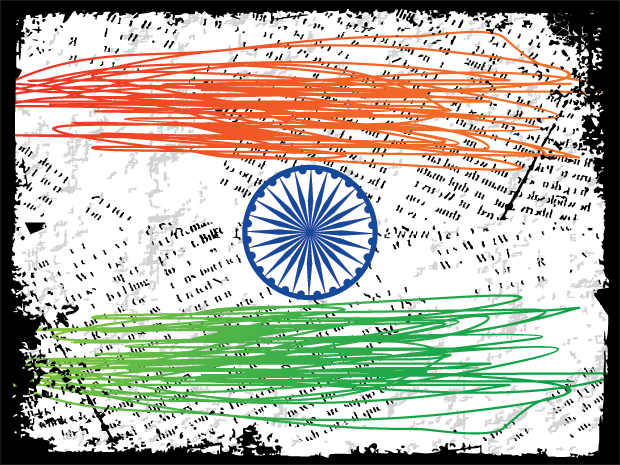26 Mar 2014 | India, News and features

Step back to 23 February. In Delhi, the caretaker of Siddharth Varadarajan’s house was roughed up by goons who left a chilling threat. “Ask your employer to hold his tongue on television,” they thundered. Professor Nandini Sundar, Varadarajan’s wife, wasn’t spared either. A threat was left for her, because she had taken a state government to court for its use of militia against its own citizens.
“Where we needed investigations, we made announcements,” lamented veteran Indian journalist P. Sainath. His stinging rebuke was against the mainstream media’s deafening silence in the face of one of the worst agrarian crisis India had faced, back in 2008. In light of this code of silence, the reasons for the incident of 23 February become clear. Compare the Indian media’s coverage of that incident with the blitzkrieg of apoplexy which greeted Aam Aadmi Party chief Arvind Kejriwal’s threat to jail journalists whom he considered to be corrupt (sold out to the Bharatiya Janata Party (BJP) – against whom he has launched an all-out war), and things fall into perspective. In case of the former, there were the usual noises and clichéd responses– condemning growing intolerance, bemoaning the rapidly shrinking space of freedom of expression, so on and so forth. The latter — Kejriwal’s threat — was greeted with a vehemence and unanimity rarely seen in the Indian media.
Both Varadarajan, former editor of The Hindu, one of India’s most respected newspapers, and Professor Sundar, sociologist, academician and civil liberties activist, have earned a considerable degree of notoriety and opprobrium, which only seem to be increasing of late. The choicest invectives are reserved for them, especially for Varadarajan. Anti-national, traitors, and shameless espousers of terrorism — the list goes on. The reason? They have been trenchant critics of the aforementioned “announcement”, as well as of proclamations of innocence by the government of Chhattisgarh state, and by the BJP’s prime ministerial candidate and his humongous band of acolytes.
Chhattisgarh, a state in central India, has been the hotbed of insurgency, the causes of which are too many and complex to be addressed here. However, the BJP-ruled government had a novel solution — raise a band of state-sponsored militia, arm them to the teeth, grant them carte blanche powers to kill, rape, maim, plunder, and unleash them on the insurgents. Sundar has been a vocal critic of such “atrocious” “counter-insurgency measures” and in 2011, acting upon her petition, India’s Supreme Court outlawed the government’s policy. The court did not mince words in its censure of a government killing its own citizens in cold blood. The government has not taken too kindly to such strictures — while continuing to subvert the court’s order, it has also accused Sundar of complicity with the insurgents.
Varadarajan stands accused of and vilified for more egregious lying. He has demonstrated the temerity to tirelessly challenge one of the most vociferous of “announcements” — that Narendra Modi has been granted a “clean chit”, meaning exoneration from a civil or criminal charge, over his role in the bloodcurdling pogrom against Muslims in Gujarat 2002. Modi’s piece de resistance of exculpatory evidence is the report of an investigation team which declared that he had no role to play in either instigating the riots, or as Chief Minister of Gujarat, directing the police and administration under his watch to go for the kill.
Varadarajan has, with staggering perseverance, been taking a sledgehammer to this impunity. Be it blowing holes in the official reason being touted, editing a collection of essays nailing the official lies, speaking about the manufacturing of “truth” and consent by a craven media, speaking up for a scrupulously researched book which exposes the investigation and “clean chit” as travesty, or adhering to his journalistic principles and refusing to kowtow to the “Modi wave” — he has left no stone unturned. And paid for it, too. In fact, one of the reasons for his resignation from as venerated a paper as The Hindu was his staunch refusal to act as a megaphone for Modi’s propaganda.
Dissent and accountability are anathema to Modi. Especially if they threaten to rip apart his assiduously crafted and forcefully propagated image of exemplary governance, and of course, his squeaky clean hands in so far as the 2002 pogrom was concerned. A 2003 documentary was banned by censors (led by a Gujarat BJP politician) because “it shows the government and police in a bad light”. Journalist Manoj Shinde had to pay with jail time on charges of sedition for mustering the audacity to criticise Modi’s handling of massive floods in 2006. And only three days ago, the police in Gujarat’s capital Ahmedabad ensured that a documentary challenging the “Modi-fied truth” did not get to be screened.
This article was published on 26 March 2014 at indexoncensorship.org
26 Mar 2014 | Digital Freedom, Gambia, News and features

The increasingly authoritarian regime of Gambia is suspected of blocking the popular social media app Viber following weeks of speculation on the government’s intentions. The government said it has not been banned and blames service providers for the outage.
Threatened by the growing popularity of free internet phone services using voice over internet protocol (VOIP), the government of Gambia is said to believe the use of such services is helping online Gambian media in the diaspora to deliver information to the public through whistle blowers.
The regime in Banjul is also looking into the possibility of extending the block to other calling apps like Skype, according to press reports.
“The government has decided to block Viber. We cannot communicate with our love ones in the diaspora”, an insider at GAMCEL, the national cellular company, confirmed to index. The source said that a new app called Hitalk can be downloaded to get the Viber-like services.
Asked what prompted the decision “it is government order and we as mere employees we have no other option to obey instructions given to us by our bosses,” the source said.
In an interview with the Standard, a local newspaper, Lamin Camara deputy permanent secretary at the ministry of information and technology denied that government blocked the app.
Camara blamed what he described as erratic network of service providers. He said patchy service is affecting the quality of calls that subscribers can make through Viber and other social media services.
Sidi Sanneh, a former Gambian civil servant and a political activist, posted an opinion piece on this blog saying that this is not the first time the regime tried to censor the internet. Sanneh described the Gambian regime as a desperate one.
“We managed to place calls to Banjul using Viber and discovered that there are some who are indeed experienced interruption of service for the past couple of days,” he stated. Sanneh went on to say that there are a few who have already resolved the problem by simply downloading other apps to get around what appears to be a nuisance.
He advised users to download a VPN client, which allows the user to be assigned a random IP address that changes every time Viber is used.
“We were told that the persons engaged by the regime to interfere with the internet are ‘amateurs who will only succeed in damaging their servers’”, Sanneh concluded
Sam Phatey, a Gambian intelligence analyst and American Street News contributor told ASN, an online Gambian newspaper, that the decision of the Gambia government is illogical.
Phatey observed that the government feels insecure and scared because exiled dissenters are using the service to plan and communicate with Gambian.
In April last year the Gambian regime ordered the Public Utility Regulatory Authority to ban the use of phone services using VOIP, the regime also imposed stiff charges on internet cafes to register for use of VoIP.
This article was published on March 26, 2014 at indexoncensorship.org
25 Mar 2014 | Digital Freedom, Events

(Image: Shutterstock)
Index on Censorship, in association with Doughty Street Chambers, invites you to attend our high-level panel discussion asking who runs the internet?
At a moment when the revelations on NSA and GCHQ mass surveillance are opening up a wide debate about our digital freedoms, our panel will discuss how free the net is today, and the main challenges that lie ahead. In the next couple of years, major international summits will debate new rules on internet governance, and whether to adopt a top-down approach as favoured by China and Russia, or maintain a more open, multistakeholder networked approach. Meanwhile, from the EU to Brazil, reactions to the Snowden’s revelations of mass snooping suggest there is a growing risk of fragmentation of the internet, with calls for forced local hosting of data.
We are delighted to be hosting speakers:
Bill Echikson – Head of Free Expression EMEA, Google
Richard Allan – Head of Europe, Middle East and Africa, Facebook
Tusha Mittal – formerly a correspondent for Tehelka and currently a Fellow at the Reuters Institute, Oxford University
Kirsty Hughes – CEO, Index on Censorship
The panel will make short introductory remarks ensuring plenty of time for a lively Q&A session.
The event will be held at Doughty Street Chambers (53-54 Doughty St, London WC1N 2LS) on Wednesday 2nd April 6-7.30pm, followed by a drinks reception. To RSVP please fill in your details here. If you have any questions please contact Fiona Bradley ([email protected]).
25 Mar 2014 | Americas, Europe and Central Asia, Events, United Kingdom, United States
Over a year after the Leveson report came out, regulation of the British press is still a question of intense debate. Meanwhile, the NSA/Snowden revelations – and the related detention of David Miranda (supported recently by British courts) – open up core questions of how investigative and public interest journalism can function in a world of mass surveillance. In the US, while Guardian editor-in-chief Alan Rusbridger rightly praises the first amendments, Obama himself has a growing reputation as a president who has pursued sources and journalists through the courts.
Join us on a Google Hangout with Guardian Digital journalist, James Ball (now based in New York) and LA Times London correspondent, Henry Chu, hosted by our Editor, Online and News, Sean Gallagher for a lively debate around the media freedom on either side of the Atlantic.
The recording will be broadcast live via Index’s Google+ and YouTube accounts from 10am (EST)/ 2pm (GMT) on Wednesday 26th March. Get involved in the discussion on our Twitter feed and website. Visit the Google+ page here and the YouTube page here.



